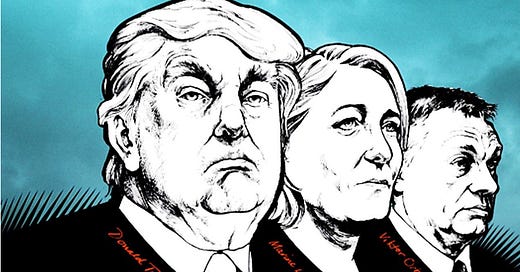Populism, which assumed its colloquial name in the United States at the end of the 18th century, describes a political ideology that emphasizes the interests of the common people over the elite. In theory, populism shares similarities with Aristotle's view of democracy which promotes equality amongst all groups and disapproved of a tyrannical elite. In this case, the disenfranchised are given the same privileges as the elite. However, theory can sometimes not become operationalized without facing some form of ideological amendment.
Aristotle, similarly, warned against the role of demagogues in democratic states. Particularly, demagogues that rely on populism rather than reasoned arguments can lead to the erosion of democratic institutions. This is an example of what is known as democratic backsliding and is currently a major factor in the modern crisis of liberal democracy. A crisis that largely affects wealthy western and European countries, many of which have seen large resurgences of populism and have elected right-wing, populist leaders such as Donald Trump, Benjamin Netanyahu, and Viktor Orban.
Right-Wing Populism
Populists can emerge on both the left-and-right sides of the political spectrum. Typically, populists, or at least successful populists, are very charismatic and embrace ‘larger than life’ personalities that seek to resonate with the average person. However, populist leaders on the right-side of the ideological spectrum go about their rhetoric differently compared to their left-wing counterparts.
Populists object to the perceived control of liberal democracy by elites, but right-wing populists deviate from left-wing populist groups by targeting identity groups instead of corporations. Specifically, right-wing populists focus largely on the perceived issue of immigration. The goal in doing this is to paint the picture that the “enemy” is immigrants coming into a country. For example, Donald Trump’s large push against “illegal” immigration to protect American citizens’ labor, wages, and lower crime. During his 2024 political campaigns, Trump would frequently refer to illegal immigrants as “Rapists,” “Blood thirsty criminals”, and “the most violent people on earth.” The purpose of this rhetoric is to convince the voter’s that the populist has their best interests, in this case, the deportation of “potentially” illegal immigrants. This type of rhetoric, regardless of how much truth there is to it, is similar to the type of inflammatory rhetoric used by other right-wing populists.
The Core Beliefs
Nationalism is the most common factor to right-wing populism. For example, the Prime Minister of Israel, Ben Netanyahu, has embraced an increasingly nationalistic attitude while in the midst of the Gaza crisis. This strong nationalistic feeling is also often aligned with isolationist policies. Isolationism refers to a set of policy beliefs that oppose international involvement and prefer to focus on domestic issues. Donald Trump is a large exhibitor of isolationist beliefs, as can be currently seen with tariff policies, however, another pseudo-isolationist would be Viktor Orban who is the leader of Hungary. He is a right-wing populist who, though he does not exhibit the same full-fledged isolationist stances as Donald Trump, utilizes the strategy of "Selective Engagement". This strategy allows Orban to pick and choose where he wants to engage internationally, typically to the benefit of Hungary.
Why is it Harmful to Democracy?
Democracy thrives off the balancing of our democratic institutions, helping to regulate the powers within our governments and, furthermore, put into place democratic norms for citizens. However, as right-wing populism focuses on attacking specific identity groups and institutions, these norms are put at risk of corroding into something dangerous for liberal society. The beginnings of democratic backsliding start at the most micro-level of democracy: The people. Right-wing populism has the potential to turn individuals against each other, convincing all parties that the reason X, Y, or Z is happening is because of the other group. Political scientist Yascha Mounk made a perfect analogy when referring to right-wing populism, specifically Donald Trump and his voters: "...his voters supposedly felt that they were stuck in a long line that did not budge, with the wrong kinds of people—notably women and ethnic minorities—cutting in line."




